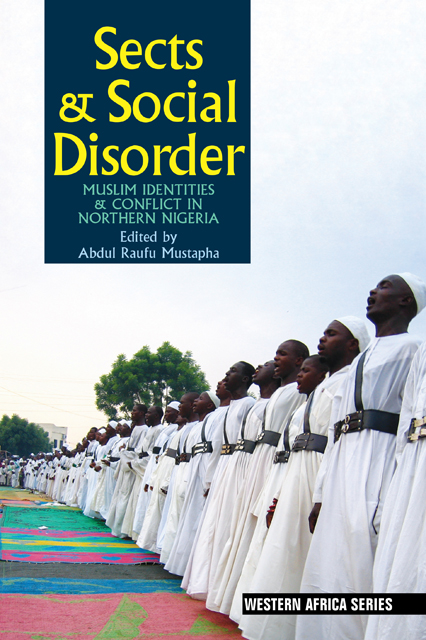Book contents
- Frontmatter
- Dedication
- Contents
- List of Maps, Figures & Tables
- Notes on Contributors
- Foreword by Muhammad Sani Umar
- Acknowledgements
- Glossary
- 1 Introduction: Interpreting Islam: Sufis, Salafists, Shi’ites & Islamists in northern Nigeria
- 2 From dissent to dissidence: The genesis & development of reformist Islamic groups in northern Nigeria
- 3 Contemporary Islamic sects & groups in northern Nigeria
- 4 Experiencing inequality at close range: Almajiri students & Qur’anic schools in Kano
- 5 ‘Marginal Muslims’: Ethnic identity & the Umma in Kano
- 6 Understanding Boko Haram
- 7 Conclusion: Religious sectarianism, poor governance & conflict
- Index
3 - Contemporary Islamic sects & groups in northern Nigeria
Published online by Cambridge University Press: 24 February 2023
- Frontmatter
- Dedication
- Contents
- List of Maps, Figures & Tables
- Notes on Contributors
- Foreword by Muhammad Sani Umar
- Acknowledgements
- Glossary
- 1 Introduction: Interpreting Islam: Sufis, Salafists, Shi’ites & Islamists in northern Nigeria
- 2 From dissent to dissidence: The genesis & development of reformist Islamic groups in northern Nigeria
- 3 Contemporary Islamic sects & groups in northern Nigeria
- 4 Experiencing inequality at close range: Almajiri students & Qur’anic schools in Kano
- 5 ‘Marginal Muslims’: Ethnic identity & the Umma in Kano
- 6 Understanding Boko Haram
- 7 Conclusion: Religious sectarianism, poor governance & conflict
- Index
Summary
Introduction
A major bone of contention in the politics of religion in Nigeria is the relative sizes of her Muslim and Christian populations. What is not in doubt, however, is that in the 19 states that make up the three northern geo-political zones of the country, Muslims are a majority, along with a significant Christian minority and a generous sprinkling of followers of African Traditional Religions. However, as Map 3.1 shows, there are significant variations in the distribution of Muslims between these states. The states in the north-west zone have the highest percentage of Muslims in their total population, followed by the states in the north-east and the north-central zones in that descending order. The divisions within this Muslim population are the subject of this chapter.
At the start of the Sokoto Jihad in 1804, virtually all Muslims in northern Nigeria subscribed to Sunni Islam of the Maliki School, with most elites also belonging to the Qadiriyya tariqa, or Brotherhood. By 1830, however, we see the introduction of the rival Tijaniyya tariqa. In the contemporary period, the Islamic doctrinal landscape has further fragmented into a myriad of competing sects and groups, including different groups of Sufis, Salafists, jihadists, Shi’ites, Islamic women’s organizations, ethnic Yoruba Muslim organizations and a host of idiosyncratic sects, some oriented towards violent politics. This process of the fragmentation of Muslim identities has resulted in the individualization of religious affiliation and heightened competition for followership in a ‘prayer economy’ led by the ‘ulama. The result of this long process is the rise of contentious religious politics which is the subject of this chapter. In this chapter we examine all the major groups and actors within the Muslim communities of northern Nigeria, their doctrinal positions and ritual practices, their claims on Muslims and others, and their political orientation towards the wider Nigerian society. We emphasize both the ways these Muslim groups perceive themselves and how they are perceived by others. Sometimes, there might be contradictions between the two, but such contradictory perceptions are nevertheless important as, right or wrong, they frame the interactions between the different Muslim groups.
- Type
- Chapter
- Information
- Sects and Social DisorderMuslim Identities and Conflict in Northern Nigeria, pp. 54 - 97Publisher: Boydell & BrewerPrint publication year: 2014
- 20
- Cited by

